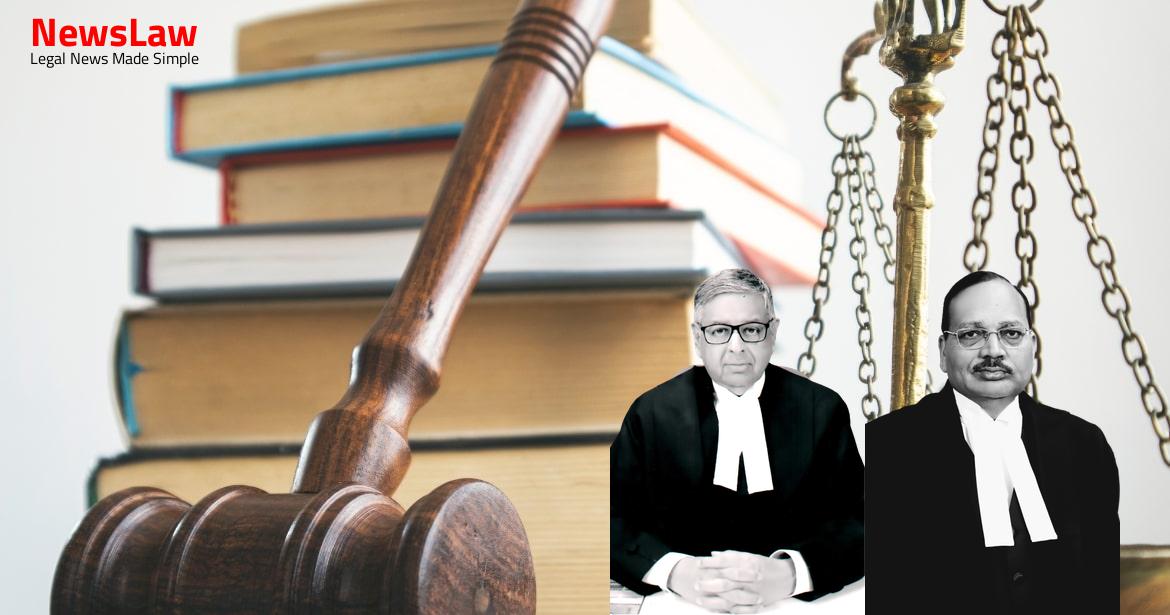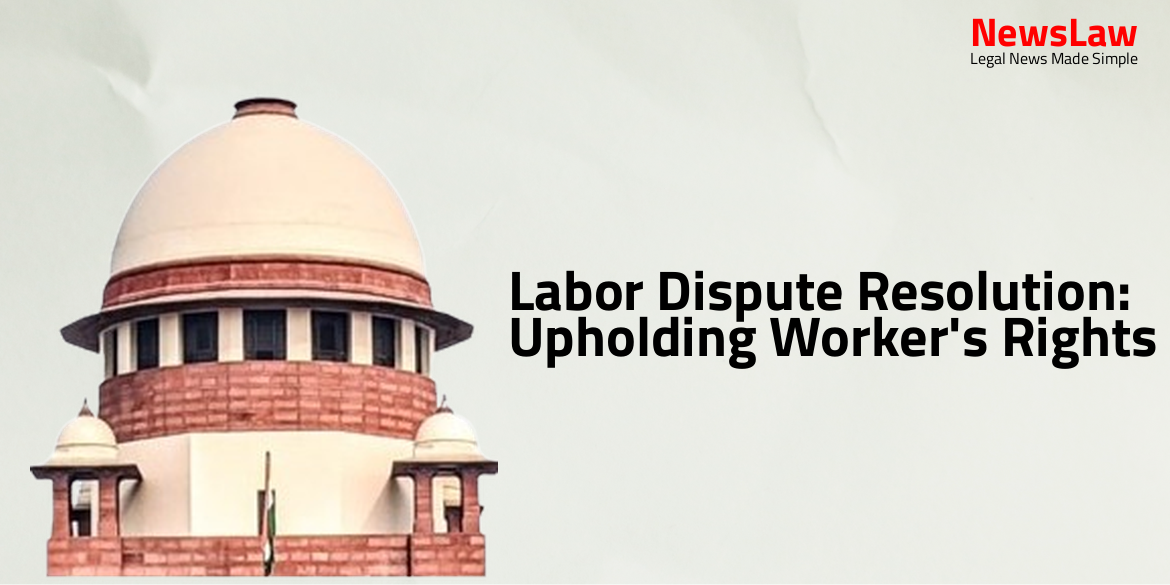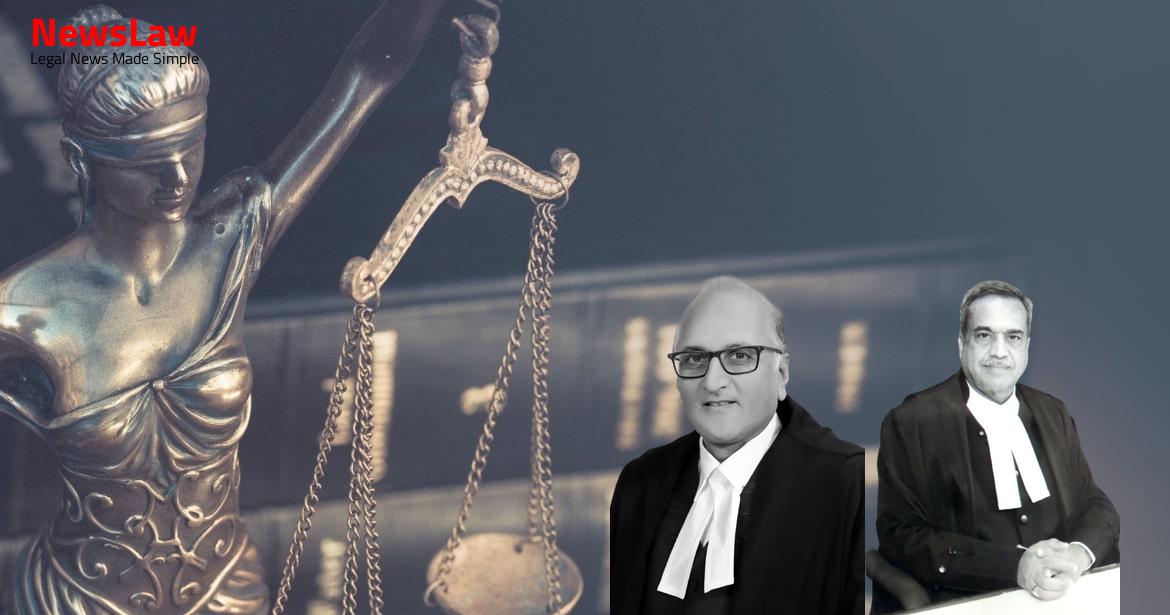The recent legal case delves into the intricacies of court intervention in arbitral awards, emphasizing the boundaries set by the law. The analysis sheds light on the restrictions placed on courts when reviewing and overturning an arbitrator’s decision. Understanding the limitations of court interference in such matters is crucial in upholding the principles of arbitration and respecting the autonomy of arbitrators.
Facts
- The appellant awarded both projects to the respondent after negotiations
- The respondent offered a 16% rebate on prices for completing the first project if awarded both contracts
- Two letters of award were issued to the respondent on 29.06.1988
- Delay in handing over sites caused construction delays in both projects
- Disputes arose regarding final payment to the respondent, leading to arbitration
- Arbitrator granted relief to respondent under different contract heads for both projects
- In the first project, a sum of Rs. 23,89,424/- with interest was awarded to the respondent
- In the second project, a sum of Rs. 24,36,532/- with interest was awarded to the respondent
- Present Civil Appeals arose from the High Court’s dismissal of the appellant’s objections to the Arbitrator’s award
- The intention of the parties was to complete the work together to reduce costs and optimize charges for the respondent.
- The appellant did not dispute the L-2 program indicating that both works were to be carried out together.
- The appellant filed objections against both awards before the Delhi High Court under Sections 30 and 33 of the Arbitration Act, 1940.
- The Single Judge of the Delhi High Court dismissed the objections of the appellant, except for modifying the interest rate, with a cost of Rs. 50,000.
- The Division Bench of the High Court dismissed the appeal challenging the above orders under Section 39, Arbitration Act, 1940, with a cost of Rs. 10,000.
Also Read: Electoral Malpractices in Mayor Election
Arguments
- The Courts below should have interfered with the award by the Arbitrator as it was passed contrary to the terms of the contract.
- The Arbitrator erred in holding the rebate as conditional, as it was not indicated in the offer by the respondent and the letter of award.
- The Arbitrator erred in granting escalation of prices when the contract expressly stated that the quoted price shall remain firm during the execution of the contract.
- The learned counsel for the appellant raised three main points: refund of rebate, grant of escalation of charges, and costs imposed on the appellant by all three forums below.
- The counsel for the respondent supported the High Court’s judgment.
- Concurrent findings were against the appellant.
- The appellant has been accused of prolonging the litigation.
- The respondent emphasized the limited scope of interference in arbitral awards.
- The Court does not sit in appeal over an arbitral award.
Also Read: Balancing Power and Transparency: Electoral Bonds Struck Down, Disclosure Mandated
Analysis
- Courts will not interfere with an arbitrator’s award if a possible view has been taken, even if a different view is possible on the same evidence.
- The Arbitrator carefully delineated the delay attributable to the appellant and granted the respondent’s claim only to that limited extent.
- The Arbitrator’s view on construction of contract clauses and grant of escalation charges was considered reasonable and not open to interference.
- The Court does not substitute its evaluation for that of the arbitrator unless there is total perversity in the award or a wrong proposition of law is applied.
- Judgments of the Court have consistently held that the Court does not sit in appeal over an arbitrator’s award.
- The scope of interference by Courts in arbitral awards passed under the Arbitration Act, 1940 is limited.
- The Arbitrator’s reasoning for the interpretation of the contract was found to be clear and based on the evidence and submissions before him.
- The delay attributable to the appellant in handing over sites led to a breach of condition for rebate, entitling the respondent to a refund.
- The Arbitrator’s assessment of delay and award of escalation charges was based on the contract terms and evidence on record.
- Alternate interpretations presented by the appellant were found to be not valid based on the facts and circumstances of the case and the arbitrator’s reasoning.
- Courts considering applications under Sections 30 or 33 of the Act do not sit in appeal over arbitrator findings.
- The phrase ‘error apparent on the face of the record’ does not imply scrutiny of document merits.
- The interpretation of a contract is within the arbitrator’s domain, and courts may not interfere if the given interpretation is plausible.
- Reappraisal of evidence is not permissible in arbitration proceedings under Section 30 of the Arbitration Act.
- Court interference is not warranted if there are no reasons provided in the award.
- Cases like State of Orissa v. Sudhakar Das have limited applicability to the issue of granting escalation charges beyond the contract period.
- In General Manager, Northern Railway v. Sarvesh Chopra, the Court upheld an arbitrator’s decision regarding escalation charges beyond the contract cap, as it was based on contract interpretation and evidentiary material.
- Court interference in arbitral awards is limited, and mere existence of another possible view is inadequate for interference.
- The scope of court interference in arbitral awards is restricted, as seen in cases like State of U.P. v. Allied Constructions and Oswal Woollen Mills Limited v. Oswal Agro Mills Limited.
- A three-Judge Bench in Assam State Electricity Board v. Buildworth Private Limited faced nearly identical circumstances to the present case.
- The appellant did not press for imposition of costs on them by the forums below.
- The judgments cited by the appellant could be distinguished based on facts.
- No error apparent on the face of the record was pointed out by the appellant.
- The appellant failed to make a case for interference with the award by the Arbitrator on the issue of costs.
- No reason found to interfere with the impugned judgment of the High Court.
Also Read: Recall of Resolution Plan Approval: Legal Analysis
Decision
- Appellant directed to pay pending amounts to respondent within 6 months
- Pending applications disposed of
- Civil Appeals filed by appellant dismissed
Case Title: NTPC LTD. Vs. M/S. DECONAR SERVICES PVT. LTD. (2021 INSC 148)
Case Number: C.A. No.-006483-006483 / 2014



